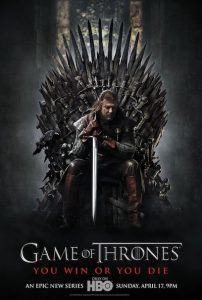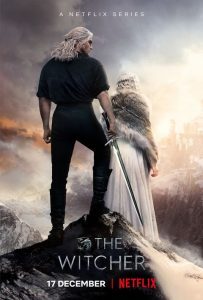A Blessing or a Curse: How Success Breeds Oversaturation
As a fan of fantasy and sci-fi, I am constantly dreaming up ideas of which stories will be adapted for the screen and creating the perfect cast in my head. It’s one of the joys of really loving something and caring about a product and feeling connected to a story. Whether it is the latest book or a new game, I’ll devour something and wonder what that story would be like if made into a film or TV series. Countless online communities do the same, sharing their ideas and rating each other’s opinions – it adds to the community aspect of a new product (although it can breed some negativity too!). There are so many incredible stories I want adapted and it feels as though just a tiny few make it to the screen which feels like a complete waste – but when something does make it on our screens and becomes popular, does it have a positive or negative effect for its fans and the genre?
 It’s all about money – we know that. TV and film companies will adapt things that they feel will be a hit and fantasy and sci-fi stories generally will end up needing large budgets which create a level of risk. They need a breakout hit to prove that there is a winning formula, but what happens next? Let’s take Game of Thrones as an example. A hugely popular book series A Song of Ice and Fire written by George RR Martin, there was no guarantee that the show would be successful. However, HBO backed the first season with money and marketing around the always incredible Sean Bean, knowing that he could draw in fantasy fans from Lord of the Rings following that trilogy becoming the most critically acclaimed of all time. Debuting in 2011, it redefined what television audiences expected from fantasy dramas and delivered a gritty, realistic series with political intrigue that draw in fantasy fans and newcomers alike. It became one of the most influential shows of the decade and naturally, everyone wanted to capitalise on its success. A wave of fantasy adaptions focusing on ‘gritty realism’ followed with the aim of finding ‘the next Game of Thrones’. Fantasy shows emerged from every streaming service and channel with varying degrees of success. The Wheel of Time finally arrived on our screens thanks to Amazon Prime which also bought the rights to Lord of the Rings for a monumental sum of money and produce The Rings of Power, a show that added a bit more grit and darkness to Middle-earth. A multitude of spin-offs in the world of Westeros were announced with many being dropped due to apparent quality issues whilst House of the Dragon and the upcoming A Knight of the Seven Kingdoms made it through. Even America’s Boy Scout and the world’s most well-known symbol of hope, Superman, took on a darker edge in the more grounded and gritty Man of Steel and follows ups Batman V Superman and The Justice League. Everything seemed to go darker and for fans of grimdark, this might sound like a great thing, but was it?
It’s all about money – we know that. TV and film companies will adapt things that they feel will be a hit and fantasy and sci-fi stories generally will end up needing large budgets which create a level of risk. They need a breakout hit to prove that there is a winning formula, but what happens next? Let’s take Game of Thrones as an example. A hugely popular book series A Song of Ice and Fire written by George RR Martin, there was no guarantee that the show would be successful. However, HBO backed the first season with money and marketing around the always incredible Sean Bean, knowing that he could draw in fantasy fans from Lord of the Rings following that trilogy becoming the most critically acclaimed of all time. Debuting in 2011, it redefined what television audiences expected from fantasy dramas and delivered a gritty, realistic series with political intrigue that draw in fantasy fans and newcomers alike. It became one of the most influential shows of the decade and naturally, everyone wanted to capitalise on its success. A wave of fantasy adaptions focusing on ‘gritty realism’ followed with the aim of finding ‘the next Game of Thrones’. Fantasy shows emerged from every streaming service and channel with varying degrees of success. The Wheel of Time finally arrived on our screens thanks to Amazon Prime which also bought the rights to Lord of the Rings for a monumental sum of money and produce The Rings of Power, a show that added a bit more grit and darkness to Middle-earth. A multitude of spin-offs in the world of Westeros were announced with many being dropped due to apparent quality issues whilst House of the Dragon and the upcoming A Knight of the Seven Kingdoms made it through. Even America’s Boy Scout and the world’s most well-known symbol of hope, Superman, took on a darker edge in the more grounded and gritty Man of Steel and follows ups Batman V Superman and The Justice League. Everything seemed to go darker and for fans of grimdark, this might sound like a great thing, but was it?
I want more fantasy out there. I want Joe Abercrombie’s First Law world to come to life on the big screen. I want to see Mark Lawrence’s Jorg be a bastard as I sit on the sofa knowing what is to come but being just as excited for how someone has adapted the incredible character. I really want Empire of a Vampire to blow people away with clever adaption of a world with Daysdeath and the Grail introduced to those who haven’t read the amazing book. But what I don’t want is countless medieval fantasy worlds trying to be ‘the next Game of Thrones’. Game of Thrones has done that and it was amazing (mostly). We don’t just need a grimdark aesthetic and high production values, we need more. We need carefully crafted stories by people who understand the source material and what makes them unique and loved by so many. If not, we end up with a market bloated with Game of Thrones rip-offs as companies vie for that same audience but with a lack of understanding of what made it such a hit in the first place.
 This brings me to The Witcher. Popular books. Wildly successful games (God I love The Witcher III: The Wild Hunt). Henry Cavill, a huge Witcher and Warhammer fan cast as the protagonist Geralt and a budget to allow for the fantasy elements to be pulled off effectively. What could go wrong? This had to be a sure fire hit. Cavill knew the source material better than most and he, and most of the cast, do amazingly well in the series from Netflix. But whilst the show is enjoyable, something is missing. Rumours spread from the set that the writers were mocking the source material and arguing with Cavill over the direction of the series and how closely it should link to the books and games and this eventually led to the star leaving. The Witcher had so much potential but instead, it is just an enjoyable but inconsistent series. Still, many people have watched it and production was then rushed on a prequel which definitely missed the mark and showed what happens when you’re trying to milk the cash cow. Animated efforts since have been more effective and allowed more creative freedom (Nightmare of the Wolf and Sirens of the Deep). I understand media being created to make money but I feel the oversaturation of the market following some success misses the point. Things are successful because they have a mix of things: a good story first and foremost, a creative team that understands the reason the story worked in the first place, and a dedication to craft something that will appeal to a wide audience without stripping the story of what makes it unique.
This brings me to The Witcher. Popular books. Wildly successful games (God I love The Witcher III: The Wild Hunt). Henry Cavill, a huge Witcher and Warhammer fan cast as the protagonist Geralt and a budget to allow for the fantasy elements to be pulled off effectively. What could go wrong? This had to be a sure fire hit. Cavill knew the source material better than most and he, and most of the cast, do amazingly well in the series from Netflix. But whilst the show is enjoyable, something is missing. Rumours spread from the set that the writers were mocking the source material and arguing with Cavill over the direction of the series and how closely it should link to the books and games and this eventually led to the star leaving. The Witcher had so much potential but instead, it is just an enjoyable but inconsistent series. Still, many people have watched it and production was then rushed on a prequel which definitely missed the mark and showed what happens when you’re trying to milk the cash cow. Animated efforts since have been more effective and allowed more creative freedom (Nightmare of the Wolf and Sirens of the Deep). I understand media being created to make money but I feel the oversaturation of the market following some success misses the point. Things are successful because they have a mix of things: a good story first and foremost, a creative team that understands the reason the story worked in the first place, and a dedication to craft something that will appeal to a wide audience without stripping the story of what makes it unique.
Competition can of course foster creativity and in the world of streaming giants, each company wants their own version of what is popular. On the other hand, excessive imitation can lead to stagnation with nothing standing out or feeling unique. Even in the superhero genre, it felt as though Marvel became too comfortable with their early success which was built on great stories with a creative team that cared (that’s how you make something like Guardians of the Galaxy a success). When they went into overdrive and began developing films at a faster rate, the quality dipped and is just now recovering as they pause and focus on quality instead of quantity. Audiences will feel overwhelmed if things feel too similar and there can be fatigue and disinterest, especially when the quality dips. It can devalue genres and make it harder for original works to break through.
It is all about innovation and not imitation. There is nothing wrong with being inspired by something successful but the key to longevity and success is not chasing trends and saturating the market with copycat works but in fostering new voices, narratives, and fresh techniques. Audiences crave originality. Two of the best modern directors, Robert Eggers (Nosferatu, The Northman) and Christopher Nolan (The Dark Knight, Interstellar, The Odyssey), don’t try to retread over old ground. Their films may have their fingerprints all over them with a similar style but they are all crafted as unique stories built with love and care and that is why they are so successful and critically acclaimed. Rather than asking, “How can we make the next Game of Thrones?” we need to ask “What’s the next great story we can tell?”. Perhaps then I will see Logen Ninefingers and Jorg delighting and disgusting audiences on the screen. Until then, I await patiently for something new in the grimdark landscape.
The post A Blessing or a Curse: How Success Breeds Oversaturation appeared first on Grimdark Magazine.



